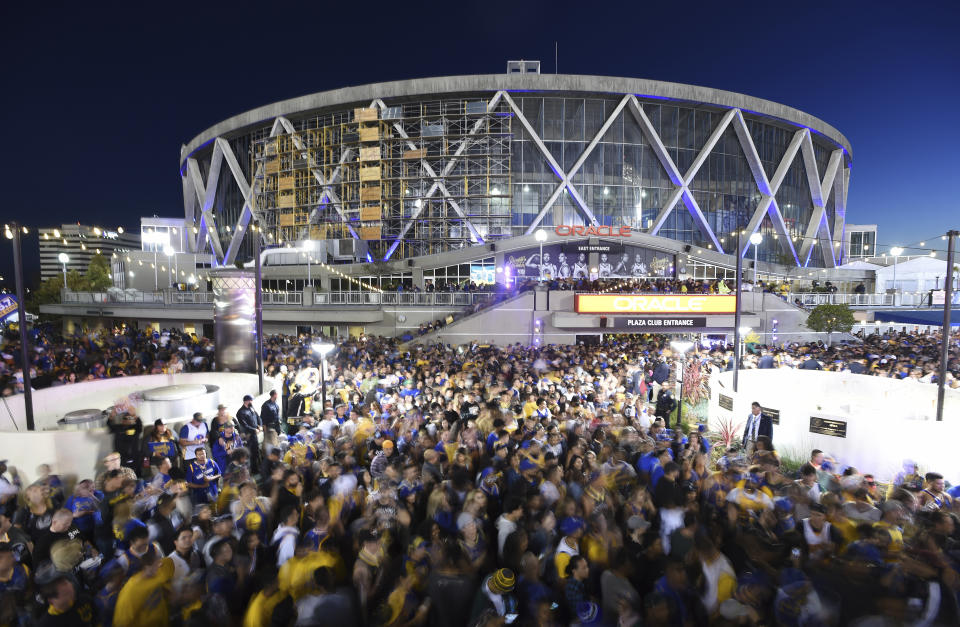Arbitrator rules against Warriors in team's attempt to saddle Oakland with debt

Not only are the Golden State Warriors leaving Oakland for shinier new digs in San Francisco next year, but the two-time defending NBA champions were hoping to saddle the city with the remainder of the bill for Oracle Arena’s $150 million renovation in 1996. An arbitrator thought better of that strategy.
In an arbitration hearing on Monday, Rebecca Westerfield ruled in favor of the Oakland-Alameda County Coliseum Authority, the public agency that leased the arena to the Warriors, ordering the team to pay the remaining $40 million owed on its 30-year renovation bond, according to multiple reports.
Catering to the Warriors two decades and one ownership group ago, the Coliseum Authority approved renovations that would gut the glass arena, installing luxury suites and club seats, along with updated scoreboards, spacious locker rooms and all the amenities required of a competitive NBA team. In return, the Warriors agreed to pay roughly $7.5 million annually until the bond was paid off by 2027.
Joe Lacob and Peter Guber, worth an estimated $2.5 billion combined, bought the Warriors from Chris Cohan for $450 million in 2010. Forbes valued the team at $3.1 billion this past February. Forty million dollars for Lacob and Guber is about the equivalent of a groin-kicking fine for Draymond Green — or just enough of a bank account hit to make the average person check his grocery store receipt twice.
Warriors fans may have bought enough Klay Thompson paraphernalia after Monday’s 3-point barrage to cover most of those costs. They probably shouldn’t have to be stuck with a $40 million tax bill, too.
However, the owners who are moving the Warriors from the city they have called home for almost a quarter-century — costing Oakland nearly 1,000 jobs and almost $100 million in annual economic activity, according to a 2015 San Francisco State University study — wanted to add tens of millions to that tab, contending the team’s financial commitment on the 1996 renovation ended with its lease agreement in 2019, when the Warriors move across the bay to San Francisco’s $1 billion Chase Center.
Even after Monday’s arbitration ruling, the Warriors didn’t sound fully sold on footing the entire bill.
“Of course we are reviewing our options at this time, but as we’ve always said, we will fulfill any debt obligations that we owe,” a team spokesperson said in a statement, according to the Associated Press.
If the team were committed to fulfilling any debt obligations owed, they would not have taken the city to arbitration, or so says the lawyer representing the Oakland-Alameda County Coliseum Authority.
“This was an after-the-fact attempt by the Warriors to rewrite the parties’ deal, and it would have left the people of Oakland and Alameda County holding the bag,” attorney Daniel Purcell said, via the AP. “We are grateful that the arbitrator saw it our way.”
This all comes a year after the Warriors engaged in a public battle with the city over funds for the team’s 2017 championship parade, which Lacob promised to pay during a celebration that took place just weeks before Oakland was forced to slash funding for homeless services, emergency responders and other government agencies amid financial concerns. The team eventually footed that bill, too.
– – – – – – –
Ben Rohrbach is a writer for Yahoo Sports. Have a tip? Email him at rohrbach_ben@yahoo.com or follow him on Twitter! Follow @brohrbach
More from Yahoo Sports:
• Shaun White’s offensive Halloween outfit draws jeers
• LeBron gets testy after leadership question
• Red-hot Klay Thompson sets NBA 3-point record
• Aaron Hernandez reportedly used drugs prior to suicide

 Yahoo Sports
Yahoo Sports 
